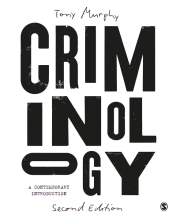Criminological theory
6 important questions on Criminological theory
Block 2 arguments are connected trough 4 points
- Pathological: presenting criminals as different from non criminals in some way
- differentiation: criminal and non criminal can be seperated
- determinism: influences on behaviours that are beyond control of offenders, biological and or psychogical in nature.
- treatment/rehabilitation: means of dealing with pathology must be considered.
Sociological and social postivism
Cultural transmission & Differential association
- Higher grades + faster learning
- Never study anything twice
- 100% sure, 100% understanding
Black, asian and minority ethnic groups (BAME)
Farrington - ICAP (integrated cognitive antisocial potential)
Moffitt - Life corse persistent/adolescent limited theory
The question on the page originate from the summary of the following study material:
- A unique study and practice tool
- Never study anything twice again
- Get the grades you hope for
- 100% sure, 100% understanding
































